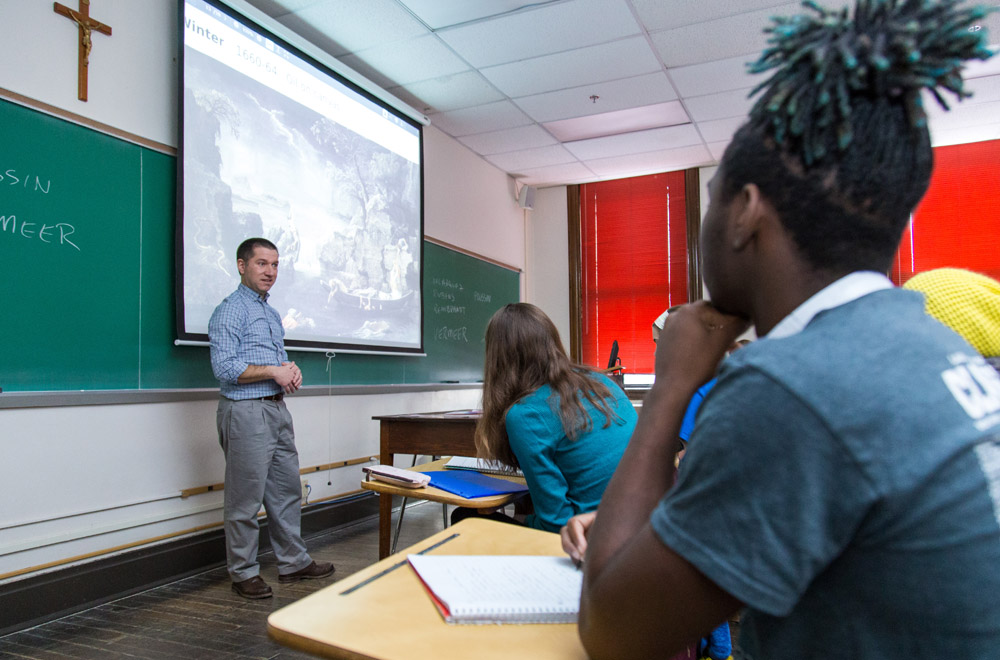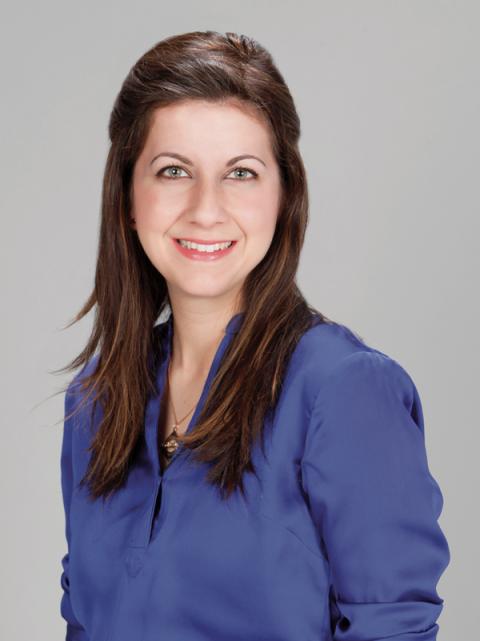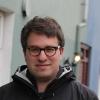
Ben Schachter teaches art history at St. Vincent College near Pittsburgh. (Courtesy of St. Vincent College/Alex Byers)
When Alan Brill and Seton Hall University colleagues met to rewrite the New Jersey-based Roman Catholic school's mission statement, the group needed a quote to include in one of the paragraphs. Brill, a rabbi who holds an endowed Seton Hall chair in Jewish-Christian studies, thought back to his time at Yeshiva University.
The mission of the Orthodox Jewish institution, located some 20 miles northeast of Seton Hall in Manhattan, centers on "Torah Umadda," Hebrew for the synthesis of sacred and secular study. Brill remembered that a quote from Cardinal John Henry Newman about the idea of the university as a merging of siloed knowledge branches was batted around a lot at Yeshiva. He shared the quote, which became enshrined in Seton Hall's ministry mission statement.
"It was second nature. It was like, 'Oh yeah. We have that quote at Yeshiva,' " Brill told NCR.
The Orthodox rabbi's ability to move seamlessly between Jewish and Catholic ideas at Seton Hall, where he has taught for more than a decade, isn't an anomaly. Brill appreciates the opportunity to discuss religion naturally in a way that isn't possible at a secular school.
"Here, religion is a live question," he said, "even if you're an atheist."
That's been artist Ben Schachter's experience teaching art at St. Vincent College, a nearly 175-year-old school near Pittsburgh. Schachter, who is Jewish, sits respectfully during the prayers that open meetings, which he called a "situational reminder" about the school's Benedictine identity.
"The Benedictines at St. Vincent do what they do seriously but also with joy, and it rubs off on you. You see them living it, struggling with it, and loving it all at the same time," he told NCR. "It becomes an intellectually honest thing that they do. It inspires me to look at my work in that same open, serious way."
Schachter, who often addresses religious subjects in his art, has found St. Vincent to be a more hospitable place than other institutions where he's taught to his bringing up religious ideas without worrying they are out of place in conversation.
"Because it isn't," he said. "Even if it isn't a Catholic idea. Religion, as a body of thought, is engaged all the time."
Religion is an essential part of art history, but art historians tend to neglect it.
"The discipline broadly doesn't look to religious art or art with religious subject matter necessarily in a favorable way," Schachter said. "I'm in a place where art is a choice that students can make and religion is present, so my work is valued. Not in the art world, but on this campus."
At Manhattan College, the Lasallian Catholic college in Riverdale, New York, Mehnaz Afridi thinks the school is the "perfect fit" for a Muslim like herself. "The Lasallian values that espouse value and dignity for another was an attraction to the college," said Afridi, associate professor of religious studies and director of the college's Holocaust, Genocide and Interfaith Education Center.
"The fact that Manhattan College was willing to hire a Muslim woman to head a Holocaust center was a brave and simple statement of its commitment," she told NCR. The school's vice president for mission, a Lasallian brother, even told her five years ago that she's a Lasallian.
"I felt so amazed that a non-Catholic could be a Lasallian," she said.
Outsiders may think professors at Catholic colleges and universities are at Mass all the time, and that the environment is strict and closed off from other traditions. That's a myth, Afridi said.
But there are challenges, like the "negative perceptions of both Jews and Muslims" that many students bring to the school before they learn about Islam. That includes viewing Muslims as terrorists, violent, oppressive and undemocratic based on media portrayals, Afridi said, which she chooses to see as both a challenge and an opportunity.
Having been raised with Jews and Christians in Europe, Afridi found it "awkward" in the Middle East that there were no Jews, so she sought to learn more about Jewish history and philosophy. In the United States, she also experienced Jewish Islamophobia, so she wanted to bridge that gap by studying the Holocaust.
"Why the Holocaust?" she said. "Because there is so much denial and relativization of it within the Muslim community. I wanted to speak out for the 'other' and stop the denial and misunderstandings between Jews and Muslims."
At Seton Hall, Brill hasn't found anyone to be unwelcoming, and given the school's location in New Jersey, he said colleagues and students have already lived alongside and befriended so many Jews that no one comes to him with questions about Jewish practices or values.
The prayers at Seton Hall events and meetings often draw from Jewish benedictions, and care is taken to refer to the Almighty in universal terms, said Brill, who has led prayers himself on occasion. He acknowledges, however, that it could be more difficult for him if he were a progressive Protestant than a Jew, where his general instinct is to keep his nose clean.
"It's not my place to get involved," he said. "I know I come from YU [Yeshiva University]. You don't get up there and say things like, 'Maimonides is an idiot.' You don't get up and say, 'Thomas Aquinas is an idiot.' It's not a good rhetorical device."

Malka Simkovich (Catholic Theological Union/Ronald Brown)*
At Catholic Theological Union in Chicago, Malka Simkovich, chair of Jewish studies and director of the Catholic-Jewish studies program, is conscious that as an Orthodox Jew, she's always the outsider in the room looking in. That's not because colleagues aren't warm and welcoming, she told NCR, but because she comes from a very different faith background.
"For this reason, I have a degree of freedom that my colleagues may not have, or feel that they don't have," she said. "And yet, the things that I can easily say at CTU are the very things which I hesitate to say to my own community. It is much easier to pontificate on matters related to leadership, gender and authority when I'm speaking to Catholics than to fellow Orthodox Jews."
Prior to coming to Catholic Theological Union to teach in 2014, Simkovich didn't appreciate the "incredible variety that exists within the Catholic tradition, both in terms of culture and theology," she said. She also didn't realize how deeply committed Catholic leaders are to Nostra Aetate, the Vatican declaration that addresses interfaith cooperation following the Holocaust's devastating impact on global Jewry.
"Before being hired at CTU, I had virtually no exposure to Catholicism as a living entity," she said. "I was surprised by how welcoming my colleagues were and how open they were to learning about my own tradition."
She hasn't found that openness to always work in reverse. Several years ago, she was talking to another mom who was also picking her child up from a Jewish school. The other mother asked if Simkovich was a stay-at-home mom, and Simkovich told her she'd just finished her Ph.D. in early Judaism and was teaching at a Catholic graduate school.
Advertisement
"She wrinkled her nose, looked hard at me, and asked, 'Why?' " Simkovich remembered. "This was actually one of many 'whys?' that I've gotten when I tell Jewish acquaintances about what I do. Many of my Jewish friends assume that all Catholics are irreparably anti-Semitic and that they harbor a secret — or not-so-secret — ulterior motive to convert Jews."
Simkovich thinks that many within the church have little exposure to living Judaism and can mistake contemporary Judaism for the way it is described in the Bible. But she tells Jewish friends that Catholics today are committed to interfaith dialogue for its own sake, rather than to missionize to Jews.
"There is a profound sensitivity to the wrongs that the church has committed to Jews over the past 2,000 years, and while those wrongs can't be undone, there is a palpable commitment to doing better in the future," she said. "If there wasn't, my position as director of Catholic-Jewish studies wouldn't exist."
[Menachem Wecker is a freelance reporter in Washington, D.C.]
*The photo credit has been corrected from the original version.







